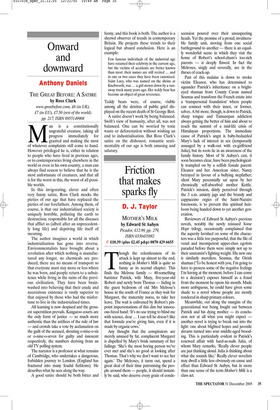Onward and downward
Anthony Daniels
THE GREAT BEFORE: A SATIRE by Ross Clark www.greatbefore.com, £6 (in UK), £7 (in EU), £7.50 (rest of the world) pp. 217, ISBN 0955149908 Man is a constitutionally ungrateful creature, taking all progress immediately for granted and making the most of whatever complaints still come to hand. However privileged he is, either in relation to people who have lived in previous ages, or to contemporaries living elsewhere in the world or even in his own country, a man can always find reason to believe that he is the most unfortunate of creatures, and that all is for the worst in this, the worst of all possible worlds.
In this invigorating, clever and often very funny satire, Ross Clark mocks the pieties of our age that have replaced the pieties of our forefathers. Among them, of course, is that our industrialised society is uniquely horrible, polluting the earth to destruction, responsible for all the diseases that afflict us (albeit after an unprecedently long life) and depriving life itself of meaning.
The author imagines a world in which industrialisation has gone into reverse. Environmentalists have brought about a revolution after which nothing is manufactured any longer, no chemicals are produced, there are no means of transport so that everyone must stay more or less where he was born, and people return to a subsistence while living in the ruins of the previous civilisation. They have been brainwashed into believing that their crude and necessitous existence is vastly superior to that enjoyed by those who had the misfortune to live in the industrialised times.
All learning is now despised and the grossest superstition prevails. Kangaroo courts are the only form of justice — so much more authentic than the artifices of the rule of law — and crowds take a vote by acclamation on the guilt of the accused, shouting o-nine-o-six or o-nine-o-seven for guilty and innocent respectively, the numbers deriving from an old TV polling system.
The narrator is a professor at what remains of Cambridge, who undertakes a dangerous, forbidden journey to London. (England has fractured into many feudal fiefdoms). He describes what he sees along the way.
A good satire should be both bitter and funny, and this book is both. The author is a shrewd observer of trends in contemporary Britain. He projects these trends to their logical but absurd conclusion. Here is an example:
Few famous individuals of the industrial age have retained their celebrity in the current age, but the victims of accidents are better known than most: their names are still recited ... and in one or two cases they have been canonised. Saint Lucy, who was named on the shrine at Knebworth, was ... a girl mown down by a runaway truck many years ago. Her teddy bear has become an object of great reverence.
Teddy bears were, of course, visible among all the detritus of public grief displayed on the recent death of St George Best.
A satire doesn’t work by being balanced. Swift’s view of humanity, after all, was not balanced. One can be worried by toxic waste or deforestation without wishing an end to industrialisation. But Ross Clark’s satire on the dishonest, romantic sentimentality of our age is both amusing and salutary.

















































 Previous page
Previous page